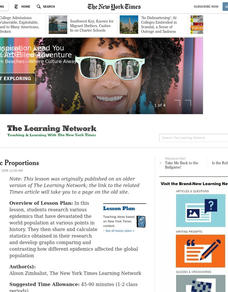K20 LEARN
If Our Classroom Were The World: Proportions And Percents
It's a small world after all. Classmates consider world population, languages, and religions in a cross-curricular activity. Applying percentages and proportions, they determine what the class make-up would be if the class represented...
Radford University
Is it Really a Small World After All?
Working in groups, learners research four countries' populations over the past 30 years. Using the data collected, the teams find regression equations that best fit the data. Taking the regression equations, they then make predictions...
College Board
2013 AP® Human Geography Free-Response Questions
How have railroads influenced urban growth? What are the consequences of population booms? What has led to the growth of tech centers like Silicon Valley? A series of short-answer questions from the College Board explores the dynamics in...
Council for Economic Education
The Neolithic Agricultural Revolution
What effect could one person's invention have on the human race? In the case of the Neolithic Agricultural Revolution, small improvements in farming methods led to increased food production. The human population began to boom, leading us...
Population Connection
Meeting Human Needs
How to meet the needs of people around the globe—a question many ask. The fifth in a six-part series about human population and its effects on the globe, the eye-opening activity includes discussion, a homework activity, and an in-class...
Population Connection
The Carbon Crunch
Carbon is in the air; should we care? Teach the class why it is important to pay attention to carbon levels and how the world population and various countries across the globe affect the carbon levels in the atmosphere. High schoolers...
Population Connection
Where Do We Grow from Here?
Did you know that the population is expected to grow to 11 billion by 2100? The resource serves final installment in a six-part series on the global population and its effects. Scholars interpret data from the United Nations about the...
Population Connection
A Demographically Divided World
Did you know that birth and life rates vary across the world? The resource, the second in a six-part series, discusses just how demographics differ across countries and why it might be the case. Scholars complete worksheets, watch...
Population Connection
The Peopling of Our Planet
How many people live on the planet, anyway? The first resource in a six-part series covers the topic of the world population. Scholars work in groups to conduct research and make population posters after learning about the global...
Amnesty International
Respect My Rights, Respect My Dignity: Module One – Poverty and Human Rights
Creating an environment where learners feel both educated and empowered challenges any teacher when discussing a sometimes bleak topic. A respectful resource provides them with the details and permits them to make a plan of action....
Amnesty International
Respect My Rights, Respect My Dignity Module Three – Sexual and Reproductive Rights Are Human Rights
Give learners the support they need to take action in their communities when it comes to sexual and reproductive rights. A resource teaches the class about global issues surrounding gender inequality, including both readings and...
Population Connection
The Human-Made Landscape
Agriculture, deforestation, and urbanization. How have human's changed the planet and how might we mitigate the effects of human activity on the planet? To answer these questions class members research the changes in human land use from...
Population Education
Population Map
Here is a very interesting graphic of a world map where each country's size is adjusted accordingly to its population. The bottom row of the document also includes several maps depicting the major shifts and growth of the world...
Curated OER
What Are We Going To Do About Baby Six Billion?
High schoolers formulate and evaluate suggestions about government policy using demographic examples and projections. They examine websites and utilize worksheets imbedded in this plan.
Curated OER
Whoa! Slow Down-Some of You!
High schoolers analyze demographic data (growth rate, natural increase, fertility rate, crude birth rates, and crude death rates) and determine which areas of the world contain the fastest and slowest growth rates. They construct...
Curated OER
World Cities of 5 Million or More
Students consult online resources to identify and map the world's largest cities and metropolitan areas. They analyze birth rates, settlement patterns and other demographic data and make predictions for the future. They write essays...
Curated OER
The World Population: Logistic Model
Learners explore the various uses of the logistic function. Students use the internet to collect world population data and find a logistic model for their data and use their chosen model to predict future populations.
Curated OER
World Population Activity II: Excel
Students import UNEP World population data/projections from either the World Population Prospects: The 2002 Revision Population Database - UN Population Division or a text file. They graph this data by itself, and then along with...
Curated OER
World Population Activity I: Excel
Students use Excel to explore population dynamics using the Logistic equation for (S-shaped) population growth. This activity is primarily intended as an introductory tutorial on using Excel.
Curated OER
Epidemic Proportions
Students research epidemics that have devastated world population at various points in history. They share and calculate statistics obtained in their research and develop graphs comparing and contrasting how different epidemics affect...
Curated OER
Math Today - World Population Milestones
High schoolers use the data from USA TODAY Snapshot "World population milestones" to explore and explain the trends in the world population.
Curated OER
Balancing Act
Young scholars investigate the dramatic increase in world population and the unequal distribution of resources. They examine the six world regions and how they are affected by the increase in population.
Curated OER
Six Billion and Beyond
Students consider the idea of a world with Six Billion people and subsequent results and ramifications. Then students will gather data regarding the state of these diverse nations and then create a presentation as a culminating activity.
Curated OER
Invisible Invaders
Students research various epidemics that have devastated the world population focusing on the historical events taking place during the times of the epidemics and the epidemics' effects on these societies.

























